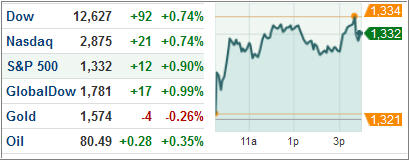Major Market ETFs rose for the second straight day on Wednesday following stronger than expected data on durable goods and housing, and ahead of a key European summit meeting starting tomorrow.
Treasuries remained near flat after the US government auctioned $35 billion in five-year notes with yields trading at less than a quarter percentage point above record lows amid relatively weak demand.
After rising about 112 points during the day’s trade, the Dow Jones Industrial Average (DJIA) vaulted 92.34 points. The blue-chip index has advanced in two sessions among three, thus clawing back nearly all the losses suffered Monday. 24 of the 30 components within Dow rose for the day.
Domestic economic data proved resilient with data published by the National Association of Realtors showing the index of pending home re-sales climbed 5.9 percent against the projected 1.1 percent, while durable-goods order rose for the first time in three months in May, gaining 1.1 percent.
The S&P 500 Index (SPX) rose 11.86 points with energy companies emerging the biggest gainer among its 10 business segments.
The yield on the benchmark 10-year notes declined less than one basis point to finish at 1.62 percent. 30-year bond yield dropped one basis point to 2.69 percent in late afternoon tradingNew York time.
ETFs in the news:
The natural gas producer-tracking First Trust ISE-Revere Natural Gas Index Fund (FCG) jumped 5.26 percent on the day, emerging one of the biggest gainers for the day.
However, natural gas lost much of its early momentum with the NG futures linked United States Natural Gas Fund (UNG) losing 0.8 percent over Tuesday’s close. However, FCG is lower about 17.5 percent year-to-date and with many analysts’ believing that NG prices have bottomed out, this ETF may witness some interesting action in the second-half of the year.
The Global X Auto ETF (VROM) tumbled 5.78 percent on the day after a research report in Zacks suggested 12 percent of auto industry suppliers don’t have sufficient working capital to support a modest 10-12 percent production growth and OEM suppliers being vulnerable to pricing pressures and production cuts. Also the demand for parts is highly concentrated with most industry suppliers dependent on a handful of US automakers.
All eyes are on the upcoming European summit which, if history is any indication will end up being a complete dud again. Endless jawboning with no concrete or agreeable solutions, at least not to paymaster Germany, should make for interesting reading but no much else.
Unless, of course, German Chancellor Merkel caves and wavers from her steadfast demands for bailout conditions, the markets will likely end up being disappointed again. While there can always be a surprise lurking in the wings, I doubt that it will be able to generate enough momentum to support any subsequent market euphoria for more than a day or two.
Disclosure: No holdings
Contact Ulli
